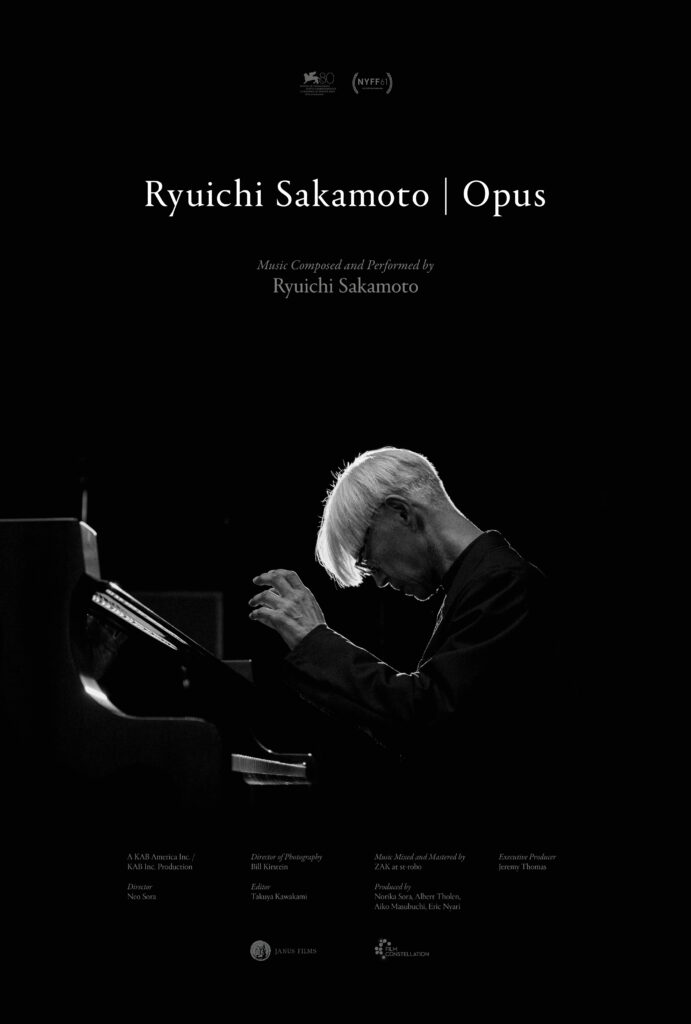Every year the Milwaukee Film Festival presents a Super Secret Members-Only Screening featuring a surprise film. Generally, it’s an upcoming independent narrative film or documentary that has some buzz or anticipation surrounding it. This year, the choice was RYUICHI SAKAMOTO: OPUS which is essentially a concert film resulting in some walkouts and a minor kerfuffle after the screening on the choice.

I admit to understanding that the film was not for everyone and think that the debate around the choice is kind of silly. More on that later. But, for this portion I intend to focus on the film itself.
RYUICHI SAKAMOTO: OPUS is simply put, a concert film. Ryuichi Sakamoto sits in a large spare room with a piano, a few microphones to record the music, and a light illuminating the sheet music and the composer. He then fills the room with music he composed, around 20 songs, for around 100 minutes. This is filmed in black and white. There are pauses, a handful of mistakes and restarts, and a lot of attention paid to Sakamoto’s concentration and occasionally his expressions as he gets caught up in his own music.
That’s the movie. At least on a surface level.
The unspoken background is that Ryuichi Sakamoto was dying of cancer when this little concert was filmed. It’s evident in his gauntness, especially in his hands which are a frequent focus of the camera. He’s old, this takes considerable effort, and this is his last performance for an audience. He’ll be gone soon, but his art will live on, which is brought into stark reality by the closing credits.
RYUICHI SAKAMOTO: OPUS is very much a love letter to the dying musician directed by his son Neo Sora. The word to describe the movie and much of Sakamoto’s music is intimate. This is a film of small moments. The hint of a smile here. Intense concentration to get through a particularly difficult section. A pause to let a note linger. The stubble on Sakamoto’s face illuminated by the light. Points where Sakamoto’s off hand appears to conduct the music. This isn’t a flashy movie, but there are many grace notes to the cinematography.
In some ways I’m reminded of STOP MAKING SENSE as a mirrored companion piece with OPUS. Roger Ebert wrote “The overwhelming impression throughout “Stop Making Sense” is of enormous energy, of life being lived at a joyous high.” I agree with that quote entirely and it’s evident every time you see the film. Like you’re encouraged to do Saturday night when it plays at the Oriental Theatre. In contrast, the overwhelming impression of RYUICHI SAKAMOTO: OPUS is one of impending death. It’s quite a contrast. And probably helps explain the difference in reception of the two films.
Now, I fully understand that the movie is not going to be for everyone. If you feel Sakamoto’s music, it’s for you. If you don’t, there’s really not much reason to stick around once you arrive at that conclusion. The film is not going to suddenly shift what it’s been. There’s no surprise plot development waiting in the weeds. A sizable majority stayed all the way through, but there were enough walk outs to be noticeable.
Which brings me to the minor kerfluffle. There was some online chatter after the film that this was the “wrong” pick for the Members-Only screening. Certainly, I wish that the folks that walked out had enjoyed the film. But, Milwaukee Film picked a critically acclaimed film that is also well rated on audience sites like Letterboxd. By all objective measures, Milwaukee Film was on safe ground. It’s just not a big broad crowd-pleaser and the kind of low key somewhat melancholy music of Sakamoto isn’t necessarily the type to get someone’s blood pumping.
I’m reminded of William Goldman’s quote “Nobody knows anything…… Not one person in the entire motion picture field knows for a certainty what’s going to work. Every time out it’s a guess and, if you’re lucky, an educated one.” It’s not so simple to program movies everyone is going to fall in love with instantly. Initially divisive films like BLUE VELVET can go on to enjoy their 30th anniversaries in a packed Oriental Theatre full of fans. So, I hope that the programmers at Milwaukee Film don’t overthink the reaction and learn the wrong lessons and stop taking chances. What’s the point of a film festival if we never see something different or challenging?
So, enough of that digression. RYUICHI SAKAMOTO: OPUS is a lovely film. “Life is short, art is long” was one of the favorite quotes of Ryuichi Sakamoto and that sums up the spirit of the film and made for one of the highlights of the festival for me.
The 2024 Milwaukee Film Festival runs from April 11, 2024 until April 25, 2024. Tickets can be purchased via MKEFILM.ORG.